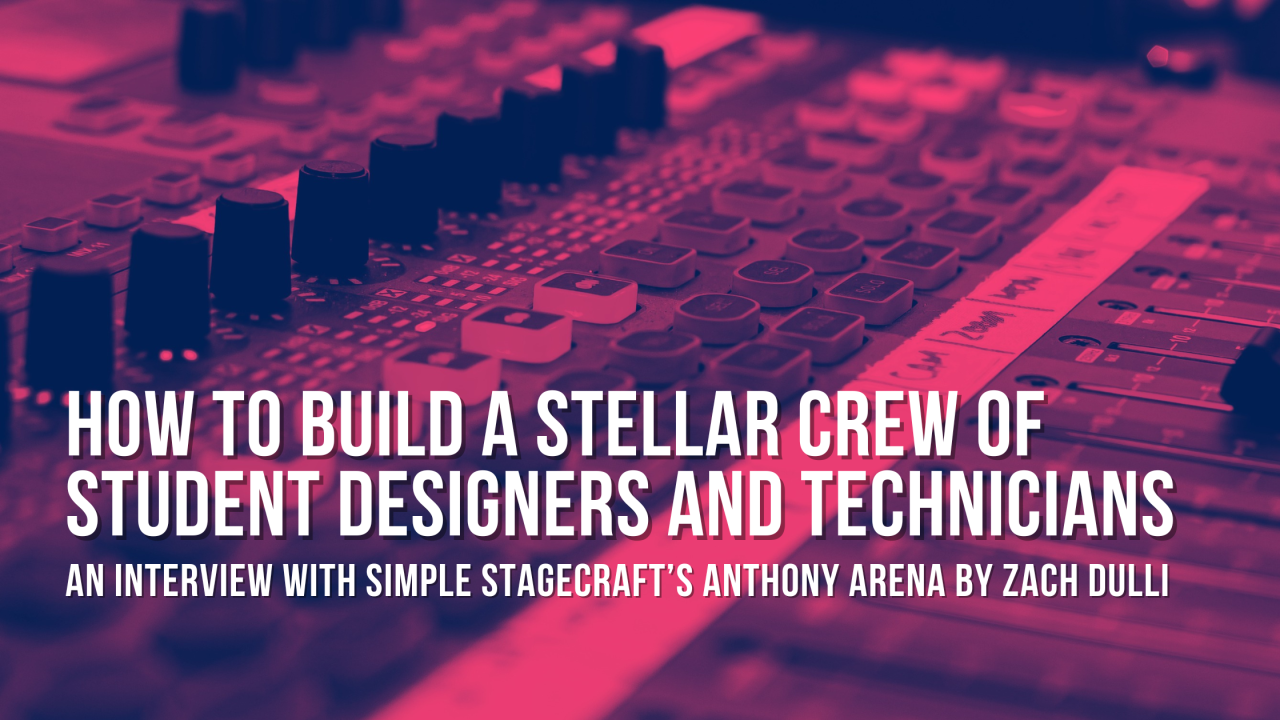by Zach Dulli, Director of Education & Community Initiatives, Broadway Licensing Group
As Director of Education and Community Initiatives here at Broadway Licensing, I’ve received numerous inquiries from theatre educators nationwide for ideas on how best to build a team of student designers and technicians for their theatre program. To help answer this question, I contacted woodworker and theatre educator Anthony Arena for his insight. Familiar to many through his YouTube channel, Simple Stagecraft, Anthony has emerged as a beacon of accessible technical theatre wisdom and resources. I spoke with Anthony this week to seek his expertise and guidance. The following conversation has been edited for length and clarity.
ZACH: What core qualities and skill sets should high school students possess to become valuable technicians and designers?
ANTHONY: The most significant thing, and I mean a good 80% of what makes an ideal technical theatre student, is eagerness and initiative. Technical skills can almost always be taught; soft skills like communication and leadership will come with time. Having a student who is eager enough, whether through a drive for success or pure excitement, to always take the initiative in their work and always be ahead of you, looking at that next step, is absolute gold. A good technician can follow instructions well and think for themselves. A great technician explains the instructions that they believe will work best moving forward. Eagerness and initiative are by no means something that a student should innately possess for the first job they are given, though. It is your job to help find a role for them about which they feel that sense of eagerness, though, of course, some students won’t quite get to that level no matter what job they have, and that is perfectly fine as well.
ZACH: In your experience, what strategies or team-building activities have you found effective in fostering a sense of camaraderie among your crew members?
ANTHONY: It can be challenging for some teachers and directors to take time away from their actors. Still, suppose you are the sole teacher of a program or both director and technical director of a production. In that case, it is imperative that your technicians and designers feel just as important as your actors. If you are in the role of an educator, news flash they are just as important. Each student, whether they are the lead carrying the show and perhaps the whole department or a student in one of your classes who helps paint a set in class one time, is a student to whom you are responsible for presenting the world of theatre. It could be the first time they have touched the world of theatre, or they could live in it daily for years. Either way, the experiences they have with you can turn them off to theatre forever or light a little spark that results in an email years later from that one painter who says, “Hey, Mrs. So-And-So, I just wanted to let you know that I switched my major to theatre. I know I wasn’t ever really involved in productions. Still, I enjoyed your class and thought this would be cool to pursue.” All this to say, sure, there are team-building exercises and bonding strategies to make your crew feel included or like a team, but any teacher who has sat through “team building” as a faculty member knows that it is ineffective when compared to the 1-minute daily check-in that your coworker has with you on the way in from the parking lot. Just extend the same check-ins you have with your actors to your technicians.
ZACH: Theatre tech can be pretty demanding. How do you motivate your crew to maintain their enthusiasm and commitment throughout production?
ANTHONY: This is a tough one, for sure. Fortunately, in the world of theatre education, productions are very limited runs. We don’t have to replicate a show eight times a week for months on end. I think the key for me is variety and improvement. There is no “Alright, that’s a wrap. Nice job, everybody, let’s do it again tomorrow!” No, we look at what happened with that rehearsal, that performance, that test run of an effect, and then we analyze the good and the bad. If something didn’t work, sweet! How do we improve that for next time? That’s easy engagement because you’re still problem-solving. In my opinion, when things are running smoothly, the enthusiasm begins to fade. But we’re not a Broadway production. There are only two more nights of performances. Challenge your technicians and designers to change things. Of course, don’t leave it open-ended like that because that will surely be disastrous. But, in the same way, you encourage your actors to keep diving deeper into their characters and lines encourage your technicians to see what tweaks they could make to their jobs to improve the show overall. And let’s be honest, how many of these shows we put on are 100% the way we want them on opening night anyway?
ZACH: Could you walk us through identifying and recruiting potential technicians or designers? What qualities do you look for?
ANTHONY: This depends on whether I’m recruiting from the student body or within my classes or program. If it’s within your classes, this is quickly done by getting to know your students a little better. Ask them questions about what they like and their interests outside of classes. Dig into why they like what they like, listening for buzzwords that could tie into an area of technical theatre. I have found very few students for whom I couldn’t find some niche of technical theatre that they could enjoy. It’s a match-making game between a student and many jobs in technical theatre. For particularly tricky students, the more specific, the better. I had a student who liked painting lines. She was moderately involved in other things as needed, but she was committed when we needed some lines painted. And that’s how you want to start. Find something they’ll wholeheartedly commit to, no matter how insignificant. They’ll take ownership of that, and before you know it, she’s the paint charge of every show her senior year. Regarding recruiting students from the greater student body, I find that most students have no idea what we do in the theatre department besides reciting Shakespeare, so a little advertising goes a long way. Bring the drills if there is some “Elective Day” or “Club Day” where you can set up a table. Bring a miter saw if you can. Set up a ladder with a stage light hanging from it. Take the soundboard! I had so many students from the school who didn’t realize that audio mixing was something that we do in theatre. Advertise the variety of pathways in your technical theatre department as much as you advertise your shows.
ZACH: How do you encourage open, effective communication among crew members, ensuring seamless production?
ANTHONY: That’s a quick one: meetings. You cannot expect all the actors in a finale to perform seamlessly if they have only ever attended separate rehearsals for “leads,” “featured dancers,” and “ensemble.” Similarly, meetings tie together the often disparate areas of technical theatre. Have them as frequently as you deem necessary. The more, the better, even if it is just a brief check-in where many areas may have no advancements to report.
ZACH: As technology evolves, so does the world of theatre tech. How do you keep students up to date with the latest advancements and trends in stagecraft?
ANTHONY: This is more of a philosophy for everything in life, but you should always question how and why you are doing what you are doing. This is the philosophy that I approach stagecraft with. I think it’s a very daunting task to constantly be on top of trends or advancements in technology from year to year, but if you haven’t made a star-drop background in a few years, do a few minutes of research. Have they invented some new cheap Christmas lights that produce an excellent star effect? Maybe you see an explanation on TikTok for an illusion that would be incredible to replicate on a cyc. Just last week, I saw a new tool that can cut cardboard incredibly fast with nearly zero risk of slicing yourself open with a utility knife. Whenever I approach a project, no matter how often I’ve done something similar, I try to devote at least a few short minutes to Googling or phoning a friend. You’ll be amazed at how many things former theatre teachers have taught us that make absolutely no sense.
ZACH: Collaboration between the tech crew and cast is vital. How do you facilitate a harmonious working relationship between these essential production components?
ANTHONY: In my opinion, and perhaps it’s a hot take, the dynamic between cast and crew depends entirely on the energy and respect a teacher/director brings to their program/production. They are all working toward the same goal with different jobs. It helps to have leaders in the department who can slide between technician and acting roles depending on the show or even the point in the process. One of my leading musical actresses was also one of our best stage managers, and I’ve had designers who decided to dip their toes in ensemble work while still holding a full designer title. I think the biggest problems I’ve encountered had to do with the authority that Stage Managers have over actors and everyone else. In those situations, you must maintain the authority of that Stage Manager in front of the cast and crew while also taking that Stage Manager aside to gently knock them down several pegs.
ZACH: The 2023-24 school year holds its unique challenges. How has the evolving landscape of education and theatre influenced your approach to building a resilient backstage crew?
ANTHONY: While I have always preached this, I think now, more than ever, it is crucial to focus on the skills and day-to-day experience rather than the product. The product is a production. Give your technicians projects that are independent of productions. It is fantastic for your friends and family to see curtains open to reveal a set you designed and built. Still, I have seen students infinitely more excited to parade a perfectly sculpted and painted prop potato through the halls. Productions are lovely, but we must give our students other things to build up their skills and confidence throughout the year. If the entire year’s success hinges on that spring musical, there is a long road to recovery for your students and your department when that spring musical can’t continue as initially planned.
Zach: Looking ahead to the future of ‘Simple Stagecraft,’ what exciting projects or initiatives do you have in mind to empower theatre tech enthusiasts further worldwide?
ANTHONY: Oh, there is quite a bit on the horizon. After having my second baby, I had to take a hefty hiatus, but now we’re coming out swinging. I started to get a lot of traction last year with my Technical Theatre Bell Ringers on TikTok, from teachers to industry professionals to former theatre kids who just wanted that dose of nostalgia. That’s going to be my priority for now, a bell ringer every weekday, and then I hope to expand into more tips, tricks, and thoughts for technical theatre through the sam medium. In the not-too-distant future, I want to ramp up the production of more instructional YouTube videos again. Still, unfortunately, that has to wait until I can justify the time commitment. Beyond that, I hope to publish some written content within the next year in the form of specific guides and techniques for engaging your student technicians and designers, as well as bolstering your own technical theatre capabilities. Some of those should find their way into workshops I plan to tour across some theatre conferences, specifically a workshop with the working title “Dungeons and Designers: Inspire Theatrical Design Through Roleplay.” Suppose you want to follow along with any of those initiatives and support the movement for technical theatre education. In that case, you can find me on TikTok and YouTube at SimpleStagecraft or both. I also recently launched a Patreon, which I hope will buy me the time to dip out of the day job more and more to create content across all these excellent mediums.
ZACH: I look forward to all your future endeavors, Anthony. Thank you for speaking with us today. I do not doubt that the information you provided today will be helpful for theatre educators everywhere. Thanks again, and congratulations on the new baby.
—
For more information on Simple Stagecraft and Anthony Arena, check out the Simple Stagecraft YouTube channel at https://youtube.com/SimpleStagecraft or visit the Simple Stagecraft TikTok page available at this link: https://www.tiktok.com/@simplestagecraft. Finally, to support Anthony and Simple Stagecraft, visit the Simple Stagecraft Patreon page: https://www.patreon.com/SimpleStagecraft.






